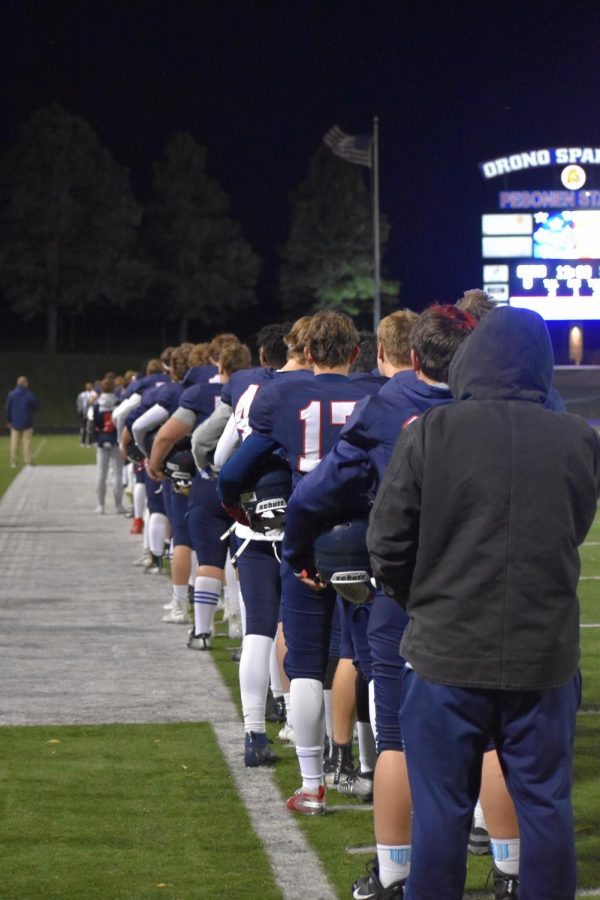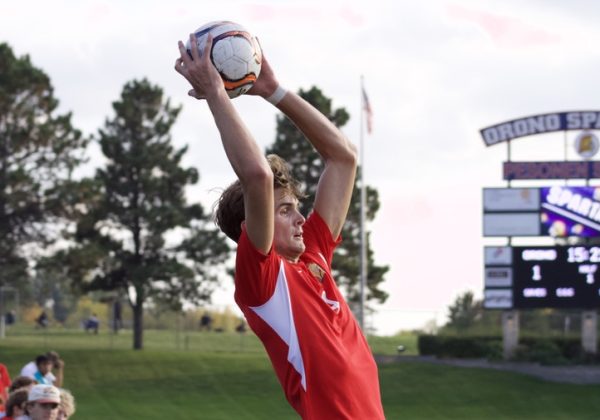How superstitions and rituals affect athletes
Many athletes have developed rituals and habits that are quintessential to their pregame routine.
January 18, 2020
Gabby Hyrkas
Staff Reporter
Superstitions and rituals are extremely common in athletics, especially at Orono High School. However superstitions and rituals are not scientifically proven to directly affect the outcome of an event\; they merely trick the athlete into believing they are able to influence a situation they have no control over, according to Jeffery Rudski, a psychologist from Muhlenberg College.
At Orono High School, many athletes have superstitions and pre-game rituals themselves to get ready for their matches. Players on the men’s hockey team have a few of their own.
“I need to chew two pieces of gum before every game, wear the same clothes, have a baseball hat on, always be wearing a sweatshirt and pants, listen to the same songs in the same order and there’s a lot more,” senior captain Zack Simon said.
Freshman newcomer Bradley Walker has unique superstitions to help him get prepared for each game.
“Some of them involve putting different pieces of equipment on first, I always have to put them on in the right order. For hockey, I always stretch at the same spot, tape my stick at the same time, and warm up at the same time too,” Walker said.
Senior soccer and track star Ally Swenson has her own superstitions and rituals before she steps on the field or track.
“Before every soccer game, my teammate Reiley has to braid the top of my head before I go out. Our coach gives us a quote before each game and I put that in my left sock… I drink a certain type of smoothie in the morning of the game,” Swenson said.
Superstitions stem from the desire to gain mental control and engagement in order to compete at high levels of competition. Research shows that athletes that have superstitions and rituals have better mental strategy and focus, thus leading them to be in a better position to do well in competition, according to Alexander S van der Merwe, a psychologist from Michigan Technological University.
“It’s something that gives you a sense of control in things that are largely outside of your control… which can give you some confidence going into a game,” psychology teacher Sarah Ibs said.
Confidence levels increase for athletes who believe their superstitions and rituals have even a little effect on the game. 19 out of 21 correlations between superstitions and confidence was statistically significant. Meaning, most athletes were more confident when their superstitions were present, as shown in a study done by Taylor Jon Ptacek at the University of North Dakota.
“I play well when I keep all my superstitions the same, and then I have the confidence that it’s gonna help me again the next game,” Walker said.
Although superstitions and rituals do not directly influence how a game goes, they are still believed by athletes due to a placebo effect. They seem to be true because there is an illusory correlation between the outcome and the belief. Olympic athletes who have rituals felt “off” when instructed to change up their ritual, which caused a decrease in mental preparedness in a study done by Nicholas M. Hobson, Devin Bonk, and Micheal Inzlicht at the University of Toronto.
“It’s an illusory correlation is what it is. So, a correlation is when two things have a relationship. With superstitions, we believe that two things relate when in reality they don’t,” Ibs said.
Rituals and superstitions are able to help athletes perform to their highest potential. Athletes with rituals and repeated habits tend to have a decrease in psychological tension, which causes stress and anxiety prior to performance according to studies done by Michaela Schippers and Paul A M Van Lange. Superstitions and rituals were shown to create motivation, improve concentration and readiness and boost confidence in a study done by Nicholas M. Hobson.
“Primarily they give me a routine and something to focus in on before the game. They just get me in the right mindset. Get me focused,” junior soccer player Jillian Cook said.
Rituals are able to regulate emotions and performance goals as well as create a better connection with others. The ability to complete a goal is increased because self control and focus is increased. They also create a sense of tightness between a team and create a stronger connection between them which allows for better shared performance, as explained in “The Psychology of Rituals: An Integrative Review and Process-Based Framework” written by Nicholas M. Hobson and Juliana Schroeder.
“Before the actual game we always say a prayer as a whole team and it’s always the same prayer. And then I have different [superstitions] with different people. Like with my coach Richie, I always the last to go on the ice so I always do handshake with him,” Simon said.
Superstitions seem to be true because of an illusory correlation between an outcome and a belief. Because of this, athletes are influenced into thinking they have a large impact on their play. At Orono, many student-athletes have superstitions and rituals which prepare them for their games, and many feel they have an effect on their performance.














